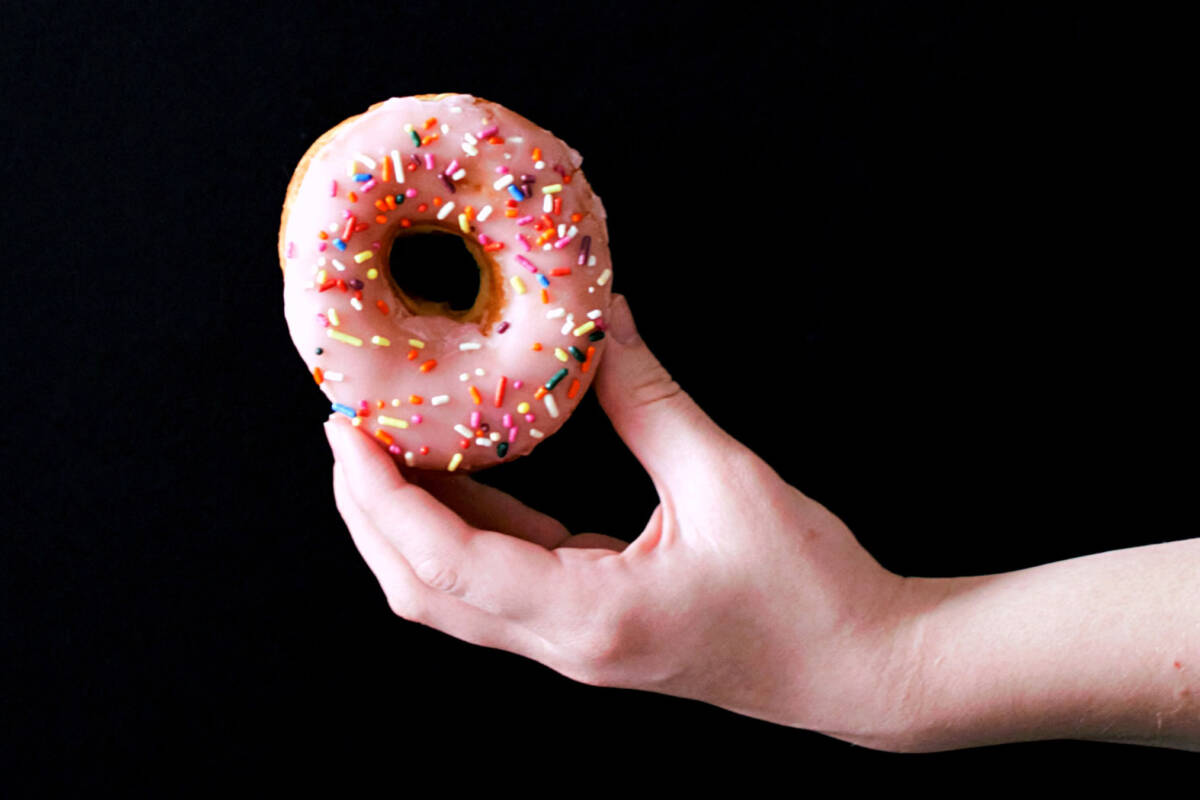
125—
Are you at a loss to explain your failed weight loss?
Period Dramas are all the rage on the ‘streaming services’. Series such as Bridgerton and Sanditon are currently super popular.
What a shame though, that our real-life, monthly Period Dramas — our raging female hormones — don’t get the same positive exposure and attention.
😃💡
Hey, HBO! I reckon I could write you a darn-good script for a harrowing series about a gang of women and their historic accounts of unnecessary, and often silent, suffering. These wretched women lead a dual existence — spending half their adult lives terrorising not only their partners, but also themselves! This series promises to be full of mental & emotional anguish, physical pain & discomfort, and lots — and lots — of bloodshed.
Oh — and bloating!
But, I’m sure I don’t have to tell you what you already know — nobody actually wants to hear about what we females really go though; all the gory — and gloomy — details. No, afflicted females are simply expected to put-up with, and shut-up about, their ‘lot’ like good ‘Little Women’. 😏
So, I think I’ll just stick to article writing for now — where I can not only share a few key points about Premenstrual Mood Disorders with you — but I can also be as mouthy-as-all-hell x
Menarche means the first occurrence of menstruation.
Menopause means the cessation of menstruation.

This article is for those of you who spend anywhere from 1/4 to 1/2 of the year (or more!) suffering with fragile mental & emotional health.
I write it in the hopes that you don’t spend this ‘down’ time on the couch watching Period Dramas (when you’re suffering from your own). Instead we can get you feeling much better, and you can go out and live your life like…like…like a man?!
“Learn to ride like a man…spit like a man”
(Sorry! I got on a carried away there – but in my defence… Titanic was the ultimate Period Drama film)
🚢👩🏻🦰🐴🤠🙌
Here’s what I need to tell you –
Instead your Naturopath will listen to your symptoms, and use their experience to determine what’s going on.
Note: I seldom rely on DUTCH testing.
(Dried Urine Test for Comprehensive Hormones.)
Use a period tracker or a diary, and pay particular attention to not only your symptoms but also to a lack of symptoms — as this can be really important for your diagnosis.
It might be that your affective disorder simply gets worse during this time.
Affective disorders are illnesses that affect the way you think and feel.
If this is the case, you actually suffer from what we now refer to as Premenstrual Exacerbation of an ongoing affective disorder (or PME). This would mean that hormonal modification treatment would not work for you.
Note: I’m so glad they changed Premenstrual Tension (PMT) to Premenstrual syndrome (PMS) as the former name just made us chicks sound uptight 😒
You might actually suffer from a Premenstrual Mood Disorder — that being, Premenstrual Dysphoric Disorder (PMDD).
This is where the psychological symptoms (mood swings, anxiety, depression, irritability) at ‘that time of the month’ are of significant intensity.
This is where you’re crying about everything, you’re crying-out to everyone but nobody really understands you, or pays any attention to your pleas.
Doesn’t mean we can’t now.
This is simply because it doesn’t come on prior to your menses. That’s why you won’t find this symptom below in the ‘how to determine if you have ___________’ boxes.

The follicular phase starts on the first day of your period and lasts for 13 to 14 days, ending in ovulation.
The luteal phasE is the second half of your menstrual cycle. It starts after ovulation and ends with the first day of your period.
Affective disorders are illnesses that affect the way you think and feel. The symptoms may be quite severe.
Somatic disorders are where a person feels significantly distressed about physical symptoms and has abnormal feelings and behaviours in response to them. These responses interfere with the person’s daily functioning.
It’s very important to track your monthly cycle every month of the year. Because things can change, and things can get complicated.
And while you could use the ‘time honoured’ method of tracking your period, as I did in my younger days – which is to simply wait for your family members, friends, or significant other to accuse you of being “premenstrual or something?!”
I highly recommend you actually beat-them-to-the-punch and warn them that you’re not in the best frame of mind at the moment.
Use a diary, or an ‘app’ – there are plenty to choose from:
Period Tracker, Flo, Clue, What’s up, MyFlo
And many more!
Make sure you track any psychological symptoms — their timing, severity, and duration.
Also track anything that helps or hinders you during this time.

Those disorders negatively impact your mental & emotional health e.g feeling angry/irritable/snappy/intolerant, anxious, depressed/sad/tearful, confused, suspicious, experiencing social withdrawal, and insomnia.
Those disorders negatively impact your physicality which in turn makes you feel distressed. The response is that it interferes with your daily functioning e.g abdominal bloating, breast tenderness or swelling, swelling of extremities, weight gain, headache, joint or muscle pain.
To ‘qualify’ for PMS you need to –
Have at least 1x symptom/disorder.
Have the symptom be present for most of the last week of luteal phase (for five consecutive days before your period.) And this symptom must interfere with some of your usual activities.
Have the issues stop within a few days of menses
Have had this occur for at least three menstrual cycles in a row.
During the lifespan of our reproductive years from Menarche to Menopause lies a spectrum of affective (mental & emotional) and somatic (physical) symptoms that we can potentially experience, ranging from:
Premenstrual Syndrome (PMS) to Premenstrual Dysphoric Disorder (PMDD).
And lying somewhere along this continuum is.
Premenstrual Exacerbation of an ongoing affective disorder (PME)
From here, you can experience different degrees of intensity of these conditions (mild, moderate, and severe).
You can progress from having one condition to another e.g you can move from having severe PMS to having PMDD.
You can suffer from two Premenstrual Mood Disorders at once e.g PME as well as PMDD
You can suffer from a Premenstrual Mood Disorder while entering into the transitionary phase of your menstrual life cycle e.g PMDD as well as Perimenopause.
(For more information on Perimenopause, please click the link.)

You already/always suffer from an Affective disorder…
And it just gets bloody worse in the lead up to your period, or during it!
If you’ve been diagnosed with Generalised Anxiety Disorder (GAD), Clinical Depressive Disorder, or even Bi Polar, and you’re still not convinced about this diagnosis because sometimes you feel perfectly fine, or sometimes you don’t feel as bad as you could — then perhaps they got it wrong? It wouldn’t be the first time 😇
Maybe you’re actually suffering from Premenstrual Dysphoric Disorder (PMDD)?
If you have PMDD your symptoms are confined to the Luteal Phase of your menstrual cycle (the two weeks before you bleed), meaning that you essentially go from being mild-mannered during the follicular stage of your menstrual cycle (the two weeks from when you start bleeding) to The Incredible Hulk/Sulk during the Luteal Phase.
But you probably already had your sex-hormone blood-work checked by the doctor and it came back as ‘normal’, right? This would have made you feel even worse (like no-ones listening & understanding, and you felt helpless & hopeless.)
And, off the back of this, you might have instead been (mis)diagnosed with all manner of health conditions ranging from neurological disorders to (other) endocrine disorders to GI disorders, and more.
However, please know, that if you suffer from PMDD you actually suffer from an abnormal response to normal surges in hormones!
I’ll say that again slightly differently:
If you have PMDD your hormones will look normal.
Normal.
Nor-mal.
Normal-as…
This is because sufferers of PMDD react differently that other woman to these 100% normal hormonal surges. And there are many reasons to explain this phenomenon, including:
Note: Past abuse is strongly co-related with moderate to severe PMS
And you won’t find any tests for these in your standard blood-work from your local GP, or actually, anywhere at this point of time. You just have to trust your Naturopath who relies on the scientific evidence, their experience, and your symptoms to choose the best treatment option/s for you.
Note: Please be aware, that at this time, the pathophysiology behind Premenstrual Mood Disorders is still not entirely clear.
Core Symptoms
Marked –
Affective lability (strong mood swings), anxiety, and/or depression
Persistent irritability
Physical symptoms
Abdominal bloating, breast tenderness or swelling, swelling of extremities, weight gain, headache, joint or muscle pain.
Other symptoms
Decreased interest in usual activities, subjective sense of difficulty in concentrating, lethargy, appetite changes, hypersomnia (too much sleep) or insomnia
To ‘qualify’ you need to –
Have at least 1x symptom from the core symptoms.
Have at least 5x symptoms in total that must be present for most of the last week of luteal phase(for five consecutive days before your period.) And, these symptoms significantly interfere with your usual activities.
Have the issues STOP within a few days of menses.
Have had this occur for at least two menstrual cycles in a row.
NB: They cannot be an exacerbation of another disorder.

Stress makes everything oh-so much worse!
Your Naturopathic treatment plan will include some or all of the following recommendations:
A prescription for stress specific supplements (as below.)
A referral to a Psychologist for CBT.
A recommendation for some gentle exercise, some moderate mindfulness, and some strong compassion for yourself…and
‘Permission’ to just hunker down during the early stages of your treatment plan, and just read trashy novels, watch NETFLIX, and order in Uber Eats until we can get on top of your Premenstrual Mood Disorder x
For PMS I primarily treat stress and hormones.
For PMDD I primarily treat stress and the underlying causes as to why you overreact to your hormones.
For PME I primarily treat stress and your affective disorder (no hormone balancing required.)
There’s a variety of different supplements and herbs that can help support you. We just have to get together to discuss what ‘mix’ will suit you best. For instance –
Minerals
Magnesium, calcium, zinc, and iron.
Vitamins
B-Complex, Vitamin D3, Vitamin C, Vitamin E
MEDICINAL Herbs
Bupleurum, St John’s Wort, Saffron, Turmeric, Vitex Agnus Castus, and Withania.
Medication – to be prescribed by your doctor
Research has shown that SSRI antidepressants may help those women suffering from PMDD (in certain cases). And, thankfully, you only need to take this at a very low dosage and only during the Luteal Phase.
Lisa Fitzgibbon is a degree qualified (2006), experienced and registered Naturopath & Medical Herbalist. She runs her own private practice – OOMPH in Grey Lynn, Auckland, New Zealand.
Lisa has been involved in the Natural Health industry for 16 years. She draws on her professional training and experience, as well as her own personal experience to bring you realistic, holistic health advice.
Book onlineIsmaili E, Walsh S, O’Brien PMS, Backstrom T, Brown C, Dennerstein L, et al. Fourth consensus of the international society for premenstrual disorders (ISPMD): auditable standards for diagnosis and management of premenstrual disorder. Arch Womens Ment Health. 2016;19:953–8. doi: 10.1007/s00737-016-0631-7
ACOG. Premenstrual syndrome. Clinical management guidelines for obsetrician-gynecologists. Int J Obstet Gynecol. 2001;73:183–91.
Hartlage SA. Gehlert S. Differentiating premenstrual dysphoric disorder from premenstrual exacerbations of other disorders: A methods dilemma. Clin Psychol Sci Prac. 2006 May 11;8:242-53. doi: 10.1093/clipsy.8.2.242.
Hantsoo L, Epperson CN. Premenstrual dysphoric disorder: Epidemiology and treatment. Curr Psychiatry Rep. 2015 Nov;17(11):87. doi: 10.1007/s11920-015-0628-3.
Gollenberg AL, Hediger ML, Mumford SL, Whitcomb BW, Hovey KM, Wactawski-Wende J, et al. Perceived stress and severity of perimenstrual symptoms: the BioCycle Study. J Women’s Health. 2010;19:959–67. doi: 10.1089/jwh.2009.1717.
Schweizer-Schubert S, Gordon JL, Eisenlohr-Moul TA, Meltzer-Brody S, Schmalenberger KM, Slopien R. Steroid hormone sensitivity in reproductive mood disorders: On the role of the GABAA receptor complex and stress during hormonal transitions. Frontiers in Med. 2021 Jan 18; 7:479646. doi: 10.3389/fmed.2020.479646
Shau-Ming W, Baller EB, Martinez PE, Goff AC, Li HJ, Kohn PD. Subgenual cingulate resting regional cerebral blood flow in premenstrual dysphoric disorder: differential regulation by ovarian steroids and preliminary evidence for an association with expression of ESC/E(Z) complex genes. Translational Psychiatry. 2021 Apr 8;11:206. doi: 10.1038/s41398-021-01328-4.
Freeman EW, Sondheimer SJ, Rickles K. Gonadotropin-releasing hormone agonist in the treatment of premenstrual symptoms with and without ongoing dysphoria: A controlled study. Psychopharmacology Bulletin. 1997;33(2):303-09.
Martinez PE, Rubinow DR, Nieman LK, Koziol DE, Morrow AL, Schiller CE, et al. 5alpha-reductase inhibition prevents the luteal phase increase in plasma allopregnanolone levels and mitigates symptoms in women with premenstrual dysphoric disorder. Neuropsychopharmacology. 2016;41:1093–102. doi: 10.1038/npp.2015.246.
Lokuge S, Frey BN, Foster JA, Soares CN, Steiner M. Depression in women: windows of vulnerability and new insights into the link between estrogen and serotonin. J Clin Psychiatry. 2011 Nov;72(11):e1563-9. doi: 10.4088/JCP.11com07089.
Halbreich U, Kahn LS. Treatment of premenstrual dysphoric disorder with luteal phase dosing of sertraline. Expert Opin Pharmacother. 2003;4:2065–78. doi: 10.1517/14656566.4.11.2065
Subscribe to LISA SAID SO
Subscribe to the LSS newsletter to get updates on a very irregular basis.
Sorry for the interruption!
You seem to be interested in what Lisa has to say. To be updated when new articles are published, or we have news to share, enter your email below. Thanks!